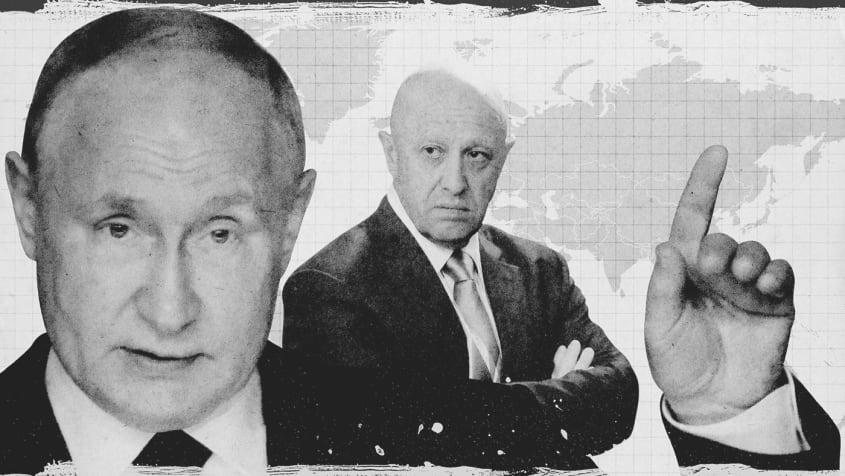How Wagner's rebellion affects the rest of the world

- Oops!Something went wrong.Please try again later.
- Oops!Something went wrong.Please try again later.
The aborted mutiny against Vladimir Putin's regime in Russia could have consequences that span the globe. The Wall Street Journal reported the unrest caused by the Wagner Group's brief insurrection has raised concerns in China about the stability of Beijing's "closest partner against the U.S.-led West." Putin's newly revealed weakness may put the partnership at risk. "This is that pessimistic scenario that China was afraid of," said one expert.
That doesn't mean that China is ready to abandon its friendship with Russia. Putin remains in charge, after all. But "I'm sure that they'll be thinking harder about alternative political scenarios than they were," Andrew Small of the German Marshall Fund told Nikkei Asia. And Chinese leaders may factor the rebellion into their thinking about any future military conflict with Taiwan.
But it's not just China. The Wagner Group "has been a critical tool for Russian President Vladimir Putin's foreign policy" in the Middle East and North Africa, the Middle East Institute noted in its blog. Wagner has operated in Syria, Libya, and Sudan in recent years. The mercenary group's newly questionable status raises questions about conflicts in those countries, and also about Moscow's reach. "What will that mean for the Russian influence and reliability in the region?"
'Clear and present danger'
Wagner's operations in Africa may have played a role in the mutiny, Le Monde reported. While the world has focused on Russia's invasion of Ukraine, and Wagner boss Yevgeny Prigozhin's critique of the war, the mercenary group's other activities also played a role in his grievances. "Wagner demanded more money and equipment to continue its actions in Africa," a French diplomatic source said, adding: "This is where it all started."
It's not ending there — at least, not yet. Russia Foreign Minister Sergei Lavrov moved this week to reassure African allies that Wagner fighters will remain deployed in Mali and the Central African Republic, The Guardian reported. Regimes in both could fall without support from Wagner and Russia. That seems unlikely for now. "What we have learnt from … Wagner in Africa, in the past five years, is that the group is resilient, creative, fearless and predatory," said Nathalia Dukhan, senior investigator at The Sentry. "So it is less likely that the Wagner empire will instantly fall like a house of cards."
All these questions affect China, Alessandro Arduino pointed out in the South China Morning Post. If Wagner's operations in Africa and the Middle East go rogue, that would present "a clear and present danger for China's Belt and Road Initiative." (That initiative builds infrastructure projects in poorer countries around the region, a foreign policy tool for cultivating Chinese influence.) The upheaval could well affect Wagner operations "from Benghazi to Darfur, in areas with a growing footprint of Chinese mining companies."
'Bet on the wrong guy'
If Wagner's mutiny upends Russia's influence in Africa, Al Jazeera reported, it might also play a role in African nations' attempts to influence the course of the Russia-Ukraine war. A group of presidents — led by South Africa's Cyril Ramaphosa — visited both countries on a peace mission earlier in June. The "attempted mutiny … will not affect our intention of continuing to engage with both countries," said South Africa's Foreign Minister Naledi Pandor.
It is the Russia-China relationship that might have the biggest impact on the rest of the world, however. Reuters reported that while "China has sought to play down the weekend's events," some observers believe leaders in Beijing are questioning whether it is time to "ease off" ties between the two countries. "It has put a fly in the ointment of that 'no-limits' relationship," said one analyst.
Chinese leader Xi Jinping "seems to have embraced Putin as an invaluable partner in his quest to push back American global power and reshape the world order in Beijing's favor," Michael Schuman wrote for The Atlantic. Putin's weakness might benefit China; Russia relies on China's trade and diplomatic support. But China faces its own problems — most notably a struggling economy. Wagner's mutiny doesn't make the relationship easier to sustain. "Watching the rebellion unfold in Russia, one might imagine that Xi now feels that he bet on the wrong guy."
You may also like
Pope Francis investigates Texas bishop, accepts early resignation of embattled Tennessee prelate
Earth's axis has shifted thanks to human groundwater pumping
Ryan Seacrest is succeeding Pat Sajak as host of 'Wheel of Fortune'

